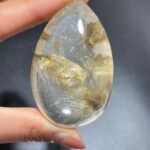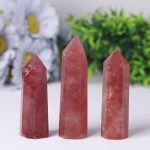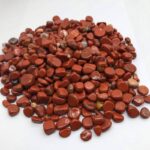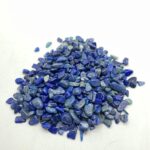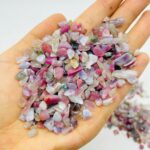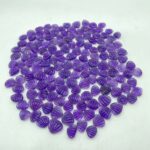Volcanic stones, formed from the molten rock ejected during volcanic eruptions, are a unique and captivating natural resource. These stones possess exceptional properties that have made them highly sought after for various applications, ranging from construction to health and wellness. In this comprehensive guide, we will delve into the fascinating world of volcanic stones, exploring their composition, benefits, and innovative applications.

Composition and Formation of Volcanic Stones
Volcanic stones are primarily composed of minerals such as basalt, andesite, and pumice. They are formed when lava or magma comes into contact with water or air, causing the molten material to cool rapidly and solidify into a rock-like substance. The composition and texture of the resulting stone depend on the type of lava or magma involved, as well as the conditions under which it cools.
Properties and Benefits of Volcanic Stones
Volcanic stones possess several unique properties that contribute to their versatility:
Durability and Strength
Volcanic stones are incredibly durable and resistant to erosion, making them ideal for construction purposes such as paving, walls, and building materials. They can withstand harsh weather conditions, including extreme temperatures, rain, and frost.
Lightweight and Porous
Pumice, a type of volcanic stone, is known for its lightweight and porous nature. It has a density lower than water, allowing it to float on the surface. This property makes it suitable for applications where buoyancy and insulation are desired.
Heat Retention
Volcanic stones retain heat exceptionally well. They can store heat and release it gradually over time, making them effective for use in thermal applications such as fireplaces, stoves, and hot tubs.
Filtration and Purification
Volcanic stones have a high surface area and a porous structure that allows them to absorb and filter pollutants and impurities from water. This property makes them valuable for water purification systems and filtration devices.
Applications of Volcanic Stones
The versatility of volcanic stones has led to their widespread use in various industries:
Construction
Volcanic stones, particularly basalt and andesite, are extensively used in construction due to their durability and strength. They are employed in paving, walls, building facades, and other architectural elements.
Landscaping and Gardening
Volcanic stones, such as lava rock and pumice, are commonly used in landscaping and gardening. They improve drainage, suppress weeds, and provide a decorative touch to gardens and outdoor spaces.
Health and Wellness
Volcanic stones have therapeutic benefits and are incorporated into various health and wellness products. They are used in massage, reflexology, and hot stone treatments to promote relaxation, reduce stress, and alleviate muscle pain.
Water Purification
Volcanic stones are employed in water purification systems due to their ability to absorb and filter contaminants. They help remove impurities, heavy metals, and bacteria from water, providing clean and purified drinking water.
Innovative Applications
Researchers and innovators are continuously exploring new and creative applications for volcanic stones. Some promising areas include:
- Energy Storage: Volcanic stones can be used to store thermal energy from renewable sources, such as solar and geothermal, for later use.
- Carbon Capture and Sequestration: The porous structure of volcanic stones allows them to capture carbon dioxide from the atmosphere, offering a potential solution for mitigating climate change.
- Soil Amendment: Crushed volcanic stones can be added to soil to improve drainage, aeration, and nutrient availability, enhancing plant growth and crop yields.
Understanding Customer Wants and Needs
To cater to the needs of customers effectively, it is crucial to understand their wants and desires. When it comes to volcanic stones, customers may seek the following:
- Durability and longevity for construction projects
- Aesthetic appeal for landscaping and gardening
- Therapeutic benefits for health and wellness
- Environmental sustainability in water purification and energy storage applications
- Innovative solutions that address specific challenges and enhance quality of life
Tips and Tricks for Using Volcanic Stones
To maximize the benefits of volcanic stones, consider the following tips:
- Choose the appropriate type of volcanic stone for your intended application, considering its composition, texture, and properties.
- Proper installation and maintenance are essential to ensure the durability and effectiveness of volcanic stones in construction and landscaping.
- Handle volcanic stones with care, as they can have sharp edges. Wear protective gear when necessary.
- Volcanic stones can be reused and recycled, contributing to sustainability efforts.
- Explore creative new applications for volcanic stones to harness their unique properties and enhance various aspects of life.
Frequently Asked Questions (FAQs)
1. What are volcanic stones used for?
Volcanic stones have a wide range of applications, including construction, landscaping, health and wellness, water purification, and innovative solutions such as energy storage and carbon capture.
2. Are volcanic stones durable?
Yes, volcanic stones are highly durable and resistant to erosion, making them suitable for construction and landscaping projects that require longevity.
3. Do volcanic stones retain heat?
Volcanic stones, especially pumice, have excellent heat retention properties and can store and release heat gradually, making them effective for use in thermal applications such as fireplaces and hot tubs.
4. Can volcanic stones be used to purify water?
Yes, volcanic stones have a high surface area and a porous structure that allows them to absorb and filter pollutants and impurities from water, making them valuable for water purification systems.
5. What is the difference between pumice and basalt?
Pumice is a lightweight and porous volcanic stone with a low density that allows it to float on water. Basalt is a dense and durable volcanic stone often used in construction due to its strength and resistance to erosion.
6. Can volcanic stones be reused?
Yes, volcanic stones can be reused and recycled in various applications. For example, old lava rock from landscaping can be crushed and used as a soil amendment to improve drainage and aeration.
7. What are some innovative applications of volcanic stones?
Researchers are exploring new applications for volcanic stones, such as energy storage, carbon capture and sequestration, and as soil amendments to enhance plant growth and crop yields.
8. How do I choose the right volcanic stone for my project?
To choose the appropriate volcanic stone, consider the intended application, composition, texture, and properties of the stone. Consult with experts or research specific types of volcanic stones to determine their suitability for your needs.












